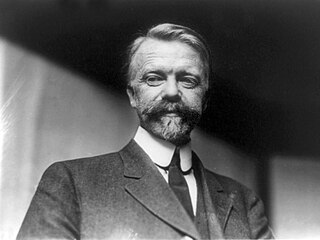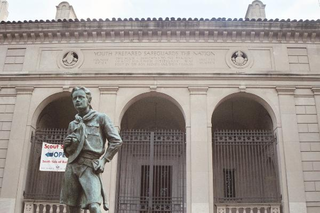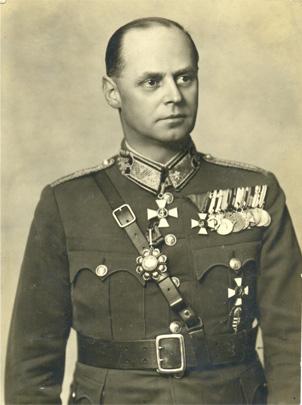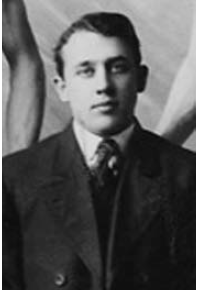
Scouting, also known as the Scout Movement, is a worldwide youth social movement employing the Scout method, a program of informal education with an emphasis on practical outdoor activities, including camping, woodcraft, aquatics, hiking, backpacking, and sports. Another widely recognized movement characteristic is the Scout uniform, by intent hiding all differences of social standing in a country and encouraging equality, with neckerchief and campaign hat or comparable headwear. Distinctive uniform insignia include the fleur-de-lis and the trefoil, as well as merit badges and other patches.

The Boy Scouts of America is one of the largest scouting organizations and one of the largest youth organizations in the United States, with over 1 million youth, including 176,000 female participants. The BSA was founded in 1910; about 130 million Americans have participated in its programs. Served by 477,000 adult volunteers. BSA became a founding member organization of the World Organization of the Scout Movement in 1922.

YMCA, sometimes regionally called the Y, is a worldwide youth organization based in Geneva, Switzerland, with more than 64 million beneficiaries in 120 countries. It has nearly 90,000 staff, some 920,000 volunteers and 12,000 branches worldwide. It was founded in London on 6 June 1844 by George Williams as the Young Men's Christian Association. The organization aims to put Christian values into practice by developing a healthy body, mind, and spirit.

Béla Heinrich Bánáthy was a Hungarian-American linguist, and Professor at San Jose State University and UC Berkeley. He is known as founder of the White Stag Leadership Development Program, established the International Systems Institute in 1982, and was co-founder of the General Evolutionary Research Group in 1984.

Magyar Cserkészszövetség, the primary national Scouting organization of Hungary, was founded in 1912, and became a member of the World Organization of the Scout Movement in 1922 and again after the rebirth of Scouting in the country in 1990. The coeducational Magyar Cserkészszövetség had 12,937 members in 2021.

In the Scout Movement, a commissioner is the volunteer whose role it is to deliver a Scout association's programs and support Scouting's units, usually within a particular geographic area. Commissioners are the volunteers who work with Scout Executives. In some Scout associations, the term Executive Commissioner is used to refer to a paid staff member

Luther Halsey Gulick Jr. (1865–1918) was an American physical education instructor, international basketball official, and founder with his wife of the Camp Fire Girls, an international youth organization now known as Camp Fire.

Scouting in the United States is dominated by the 1.2 million-member Boy Scouts of America and the Girl Scouts of the USA and other associations that are recognized by one of the international Scouting organizations. There are also a few smaller, independent groups that are considered to be "Scout-like" or otherwise Scouting related.

The Jerome War Relocation Center was a Japanese American internment camp located in southeastern Arkansas, near the town of Jerome in the Arkansas Delta. Open from October 6, 1942, until June 30, 1944, it was the last American concentration camp to open and the first to close. At one point it held as many as 8,497 detainees. After closing, it was converted into a holding camp for German prisoners of war. Today, few remains of the camp are visible, as the wooden buildings were taken down. The smokestack from the hospital incinerator still stands.

The Boy Scouts of America (BSA) was inspired by and modeled on The Boy Scouts Association, established by Robert Baden-Powell in Britain in 1908. In the early 1900s, several youth organizations were active, and many became part of the BSA.

The Medical Cadet Corp (MCC) is a program of the Seventh-day Adventist Church. It started in the 1930s in the United States with the intention of preparing young men of draft age for military service in noncombatant roles. The training included drill, first aid, military courtesies, organization of medical corps, defense against chemical warfare, principles of anatomy and physiology, physical exercises and character development. The program was temporarily suspended at the end of World War II. It was reactivated in 1950 then a few years after was adapted internationally. The program was deactivated by the General Conference of Seventh-day Adventists in early 1972 but continued independently in a few locations with an emphasis on rescue and disaster response.
YMCA Camp Belknap is an all-boys summer resident camp in Tuftonboro, New Hampshire, on the shores of Lake Winnipesaukee. Founded in 1903, on Winnipesaukee's Timber Island, in the shadow of Belknap Mountain, its likely namesake. Relocated to Tuftonboro in 1907, this boys' camp was owned and operated by the New Hampshire YMCA until the demise of the state Y in 1996. It is now an independent non-profit affiliated with the national Y. Belknap celebrated its 100th year in operation in 2003, making it one of the oldest continuously operating camps in the United States.

The Kautz Family YMCA Archives, located at the University of Minnesota Libraries in Minneapolis, United States, archives the historical records of the U.S. YMCA national association, YMCA of the USA, the records of the Minneapolis and Greater New York YMCAs, and those of the Y's Men International, a service club in partnership with the YMCA.

Ferenc Farkas de Kisbarnak was Chief Scout of the Hungarian Boy Scouts, commanding officer of the Royal Ludovica Military Academy, the country's officer training school, and General of the Hungarian VI Army Corps during World War II. He served under several political regimes including that of Charles IV King of Hungary, Regent Miklós Horthy, Prime Minister Pál Teleki, and Arrow Cross Party leader Ferenc Szálasi. He was the Captain General of the Order of Vitéz between 1962 and 1977. His service through the end of the World War II resulted in controversies within Hungary that followed him until his death.

The 1918 college football season was a season of college football in the United States. There was no consensus champion, with the Official NCAA Division I Football Records Book listing Michigan and Pittsburgh as national champions.

Ioan Dem. Dimăncescu was a Romanian army officer, with a degree in physical education. He participated in the Boy and Girl Scouts programs of Romania and was a Scout leader.

Elwood Stanley Brown was an American sports administrator, and basketball coach. As a leader in the YMCA, he promoted sports in the Philippines, helped establish the Far Eastern Games, and founded the first Boy Scout troops in the Philippines. He also helped organize the American Expeditionary Forces Games and the Inter-Allied Games. Brown worked closely with Pierre de Coubertin and the International Olympic Committee in propagating the Olympic Games through the YMCA.

The National Council of Young Men's Christian Associations of the United States of America is part of the worldwide youth organization YMCA.

In the Boy Scouts of America, a Scout leader refers to the trained leaders of a Scout unit. Adult leaders are generally referred to as "Scouters," and the youth leaders are referred to by their position within a unit. In all Scouting units above the Cub Scout pack and units serving adolescent Scouts, leadership of the unit comprises both adult leaders (Scouters) and youth leaders (Scouts). This is a key part of the Aims and Methods of Scouting. In order to learn leadership, the youth must actually serve in leadership roles.

















